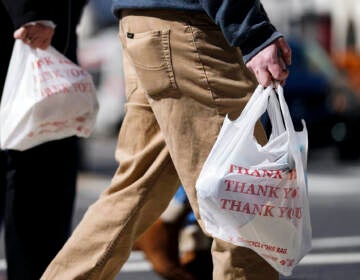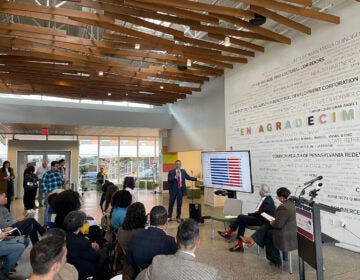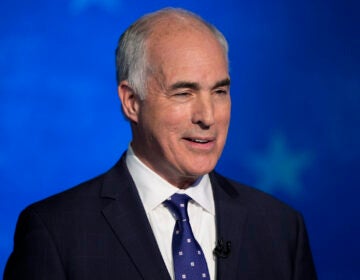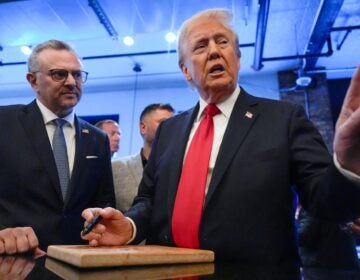Combating misinformation: How Philly, national organizers are fighting fake news and propaganda targeting Latino voters
“Latinos tend to be some of the most prime targets for mis- and disinformation narratives,” said Claudia Ruiz of UnidosUS.
Listen 1:08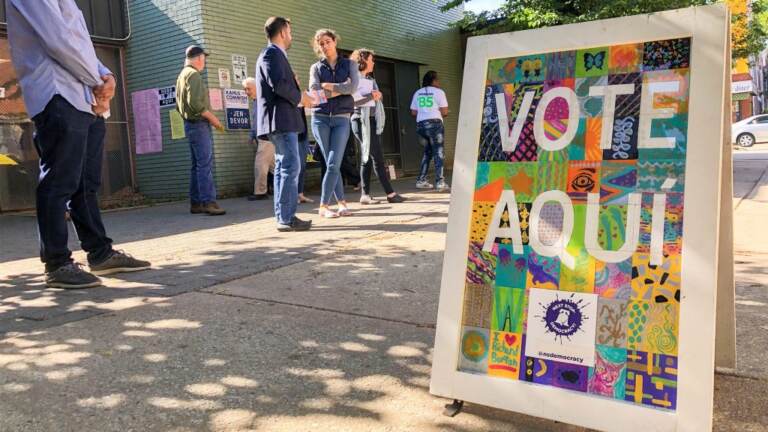
(Danya Henninger/Billy Penn)
What questions do you have about the 2024 elections? What major issues do you want candidates to address? Let us know.
Misinformation and disinformation targets voters throughout the United States, especially during election season, when social media is rife with fake videos and false narratives.
But Latino and/or Spanish-speaking voters are particularly vulnerable, said Claudia Ruiz, civil rights policy advisor at UnidosUS, the nation’s largest Hispanic civil rights and advocacy organization.
“Latinos tend to be some of the most prime targets for mis- and disinformation narratives,” Ruiz said. “At the same time, they also tend to be the number one subject of a lot of mis- and disinformation narratives, as well. So what that does is it kind of primes Latino voters to live within this information and news ecosystem that is over-indexing in mis- and disinformation, or just false narratives in general.”
Researchers, fact-checkers and organizers have been focused on combating the problem this election cycle.
Factchequeado, the first U.S. organization dedicated to fighting disinformation in Spanish, has reached 3 million Latinos this year.
But, it isn’t an easy battle to fight because of the nature of challenges.
Ruiz said Latino and/or Spanish-speaking voters tend to get more of their news from social media and other online platforms such as TikTok, Meta, WhatsApp and YouTube. These platforms aren’t actively monitoring disinformation and misinformation in Spanish as closely as English-language content. Ruiz said the problem is amplified by the dearth of Spanish-language media outlets and Spanish-language translations from local and national media organizations.
The cost of a lack of reliable information in Spanish along with less outreach to Latinos is high, Ruiz said.
“It kind of primes them to be … targets for mis- and disinformation, which can then turn around and translate to sort of lower voter turnout [and] a lot more anxiety, fear and hesitation around voting,” she said.
On top of that is the reality that “historically, as a community, Latinos, and Latino voters in particular, have been under-resourced, under-invested in and under-engaged,” Ruiz said, creating “the perfect opening to have a flood of mis- and disinformation come at them.”
That lack of engagement is borne out by a recent UnidosUS poll, Ruiz said, which found nearly half of Latino voters have not been contacted by a political candidate or party this election cycle. However, other polls show that trend could be changing, especially as the community has emerged as the second-largest voting bloc in the country.
Ruiz said her organization is using “culturally competent messaging” to empower the community with facts.
“Another piece of our work that we do at Unidos is … making sure that any kind of messaging is actually helping and empowering Latinos to vote, rather than allowing them to kind of feel isolated within a lot of the confusion and the chaos and the fear,” Ruiz said.
A lot of this messaging takes the form of what she described as “truth sandwiches.”
The “sandwich” begins with delivering accurate information framed according to the values and priorities of Latino voters. The middle of the sandwich is explaining how and why disinformation and misinformation is happening around the particular issue — but the goal is not to repeat the inaccurate information itself, Ruiz said.
“What you want to do is stay adjacent to the disinformation, but never actually repeat it, or you might be at risk of just kind of further cementing that in someone’s mind,” she said.
To close off the sandwich, the messaging then goes back to the facts shared at the beginning, reiterating why the information is important for voters.
In Philadelphia, Councilmember Quetcy Lozada, who represents the majority-Latino 7th District, said her office has received calls from constituents who are concerned about or confused by information in political ads and TV commercials.
“We are not allowed to conduct political business,” Lozada said. “And so we typically refer them to either the Board of Elections or to one of the nonpartisan groups … like The Committee of Seventy. We ask them to connect with those groups so that they can help them respond.”
Lozada urged Philadelphians to call the secure voter hotline at 866-OUR-VOTE on or before Election Day for support in either English or Spanish.
Ruiz said her organization will continue to fight deceptive information even after the polls close Nov. 5.
“As we head into Election Day and the immediate days and weeks following, and as we make our way closer and closer to Inauguration Day, what we are doing is take a closer look at some of those battleground states,” she said. “We’re also going to take a look at states where maybe there might be some kind of after-election shenanigans going on, just to make sure that we’re kind of functioning a little bit better as sort of a rapid response messaging kind of outfit.”
To access safe, reliable information in Spanish about this year’s elections, read on below. Note: This is not a comprehensive list.
Se puede acceder a información precisa y fiable sobre las elecciones de este año en las siguientes plataformas:
Información enfocada en Filadelfia y Pensilvania
- Departamento del estado de Pensilvania
- Associated Press
- Impacto
- Línea de texto de Equal Info
- Philatinos Radio
- The Philadelphia Citizen
- Spotlight PA
- Telemundo Filadelfia
Organizaciones nacionales

Get daily updates from WHYY News!
WHYY is your source for fact-based, in-depth journalism and information. As a nonprofit organization, we rely on financial support from readers like you. Please give today.



